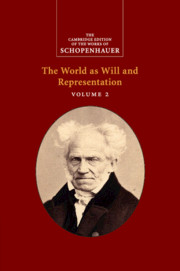Chapter 24 - On Matter
Published online by Cambridge University Press: 30 June 2022
Summary
We already mentioned matter in the fourth chapter of the supplements to the First Book, while examining that aspect of our cognition of which we are a priori conscious. But there we could only examine it from a one-sided perspective, because we were focusing solely on its relation to the forms of the intellect and not to the thing in itself, and so we investigated it only from the subjective side, i.e. to the extent that it is our representation, and not from the objective side, i.e. according to what it might be in itself. In the first regard, our conclusion was that it is efficacy in general, apprehended objectively but without more precise determination; this is why it occupies the place of causality in the table given there of our a priori cognition. For the material is activity (actuality) in general and apart from the specific mode of its action. So matter, merely as such, is not an object of intuition but only of thought, and therefore a genuine abstraction: in intuition on the other hand it occurs only in connection with form and quality, as a body, i.e. as a fully determinate mode of acting. Only by abstracting from these more precise determinations can we think of matter as such, i.e. divorced from form and quality: consequently we think of matter as acting as such and in general, which is to say, efficacy in the abstract. Any more precisely determined action we apprehend as the accident of matter: but it is only in this way that matter becomes intuitive, i.e. presents itself as a body and object of experience. On the other hand, as I have shown in the critique of Kantian philosophy, pure matter, which is the only constituent of the actual and legitimate content of the concept of substance, is causality itself, conceived objectively and therefore spatially and thus as filling space. Accordingly, the whole essence of matter consists in acting: only by acting does it fill space and persist in time: it is nothing but causality through and through. Thus where there is action, there is matter, and the material is activity in general.
Information
- Type
- Chapter
- Information
- Schopenhauer: The World as Will and Representation , pp. 317 - 330Publisher: Cambridge University PressPrint publication year: 2018
